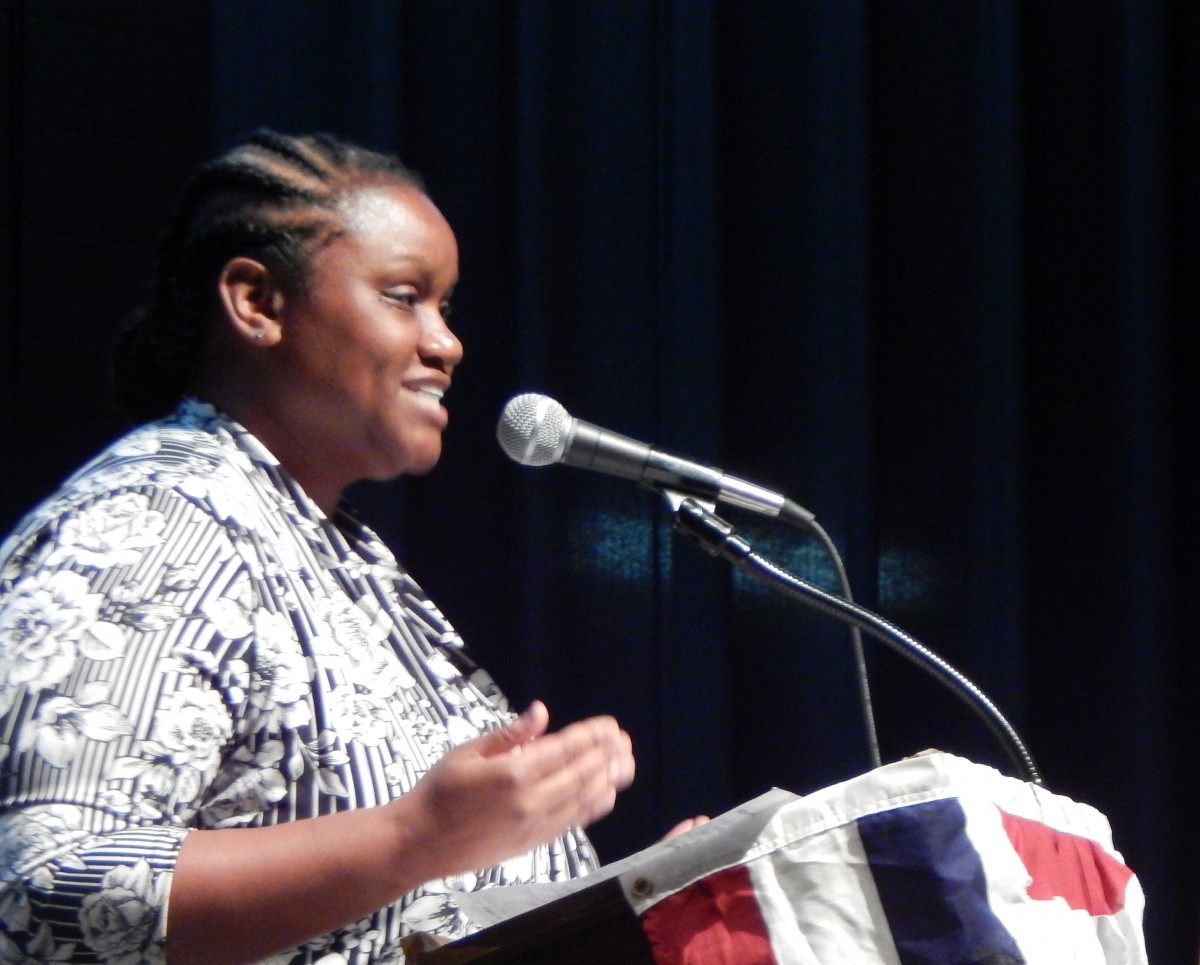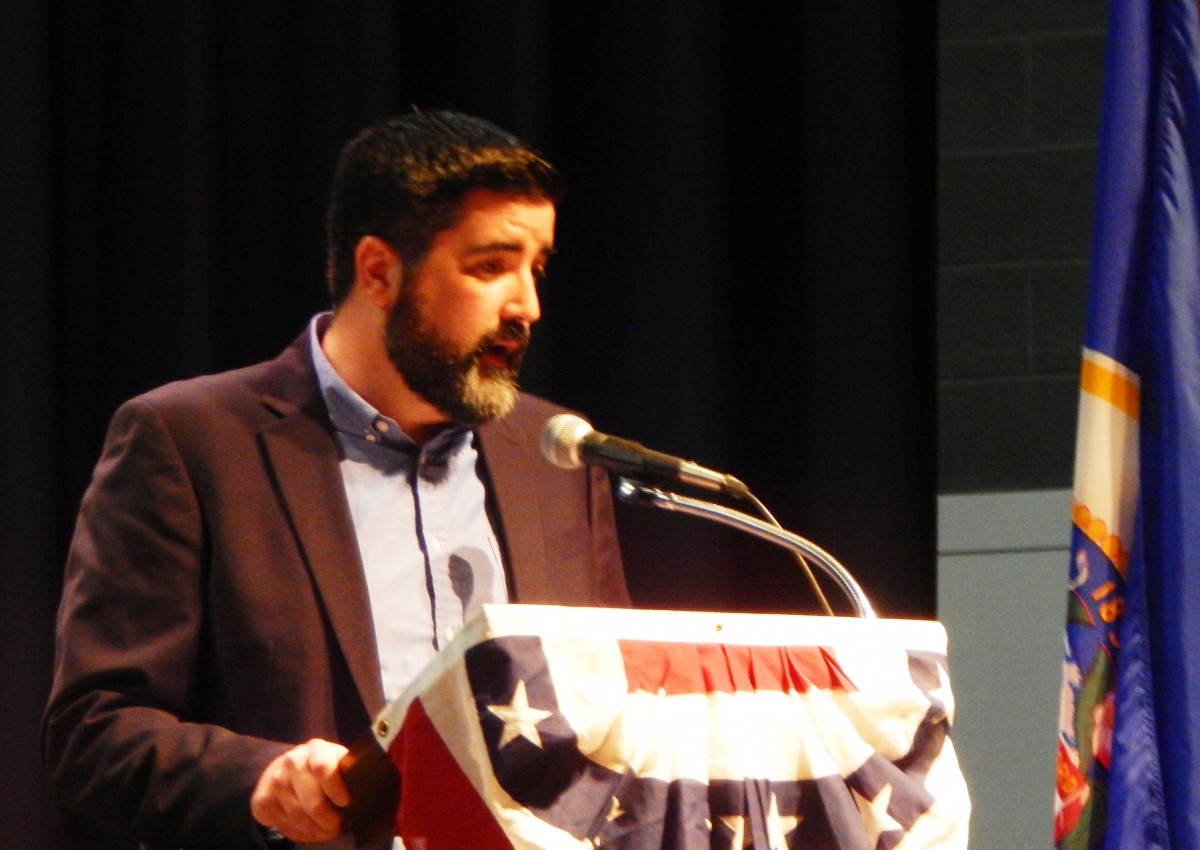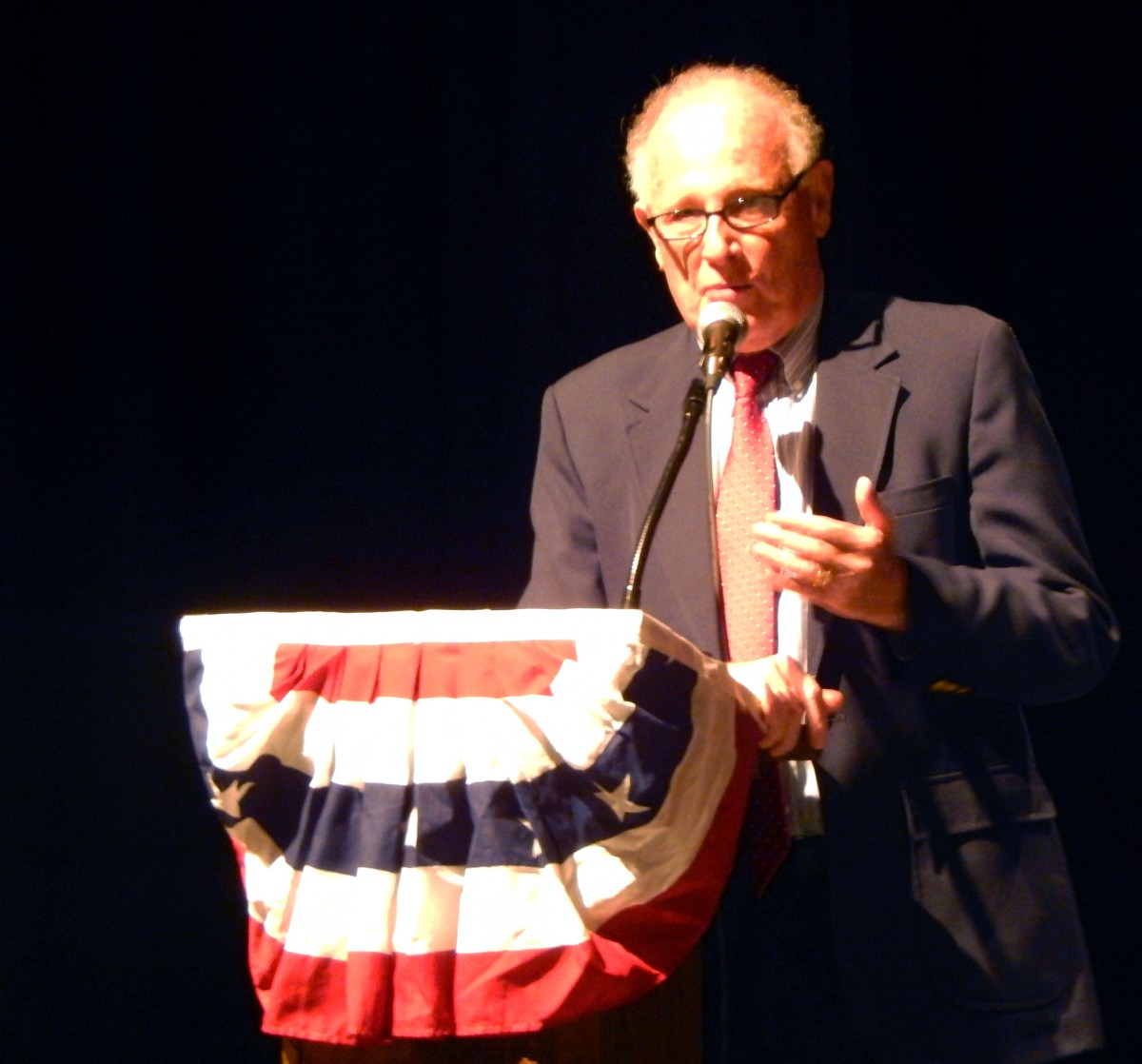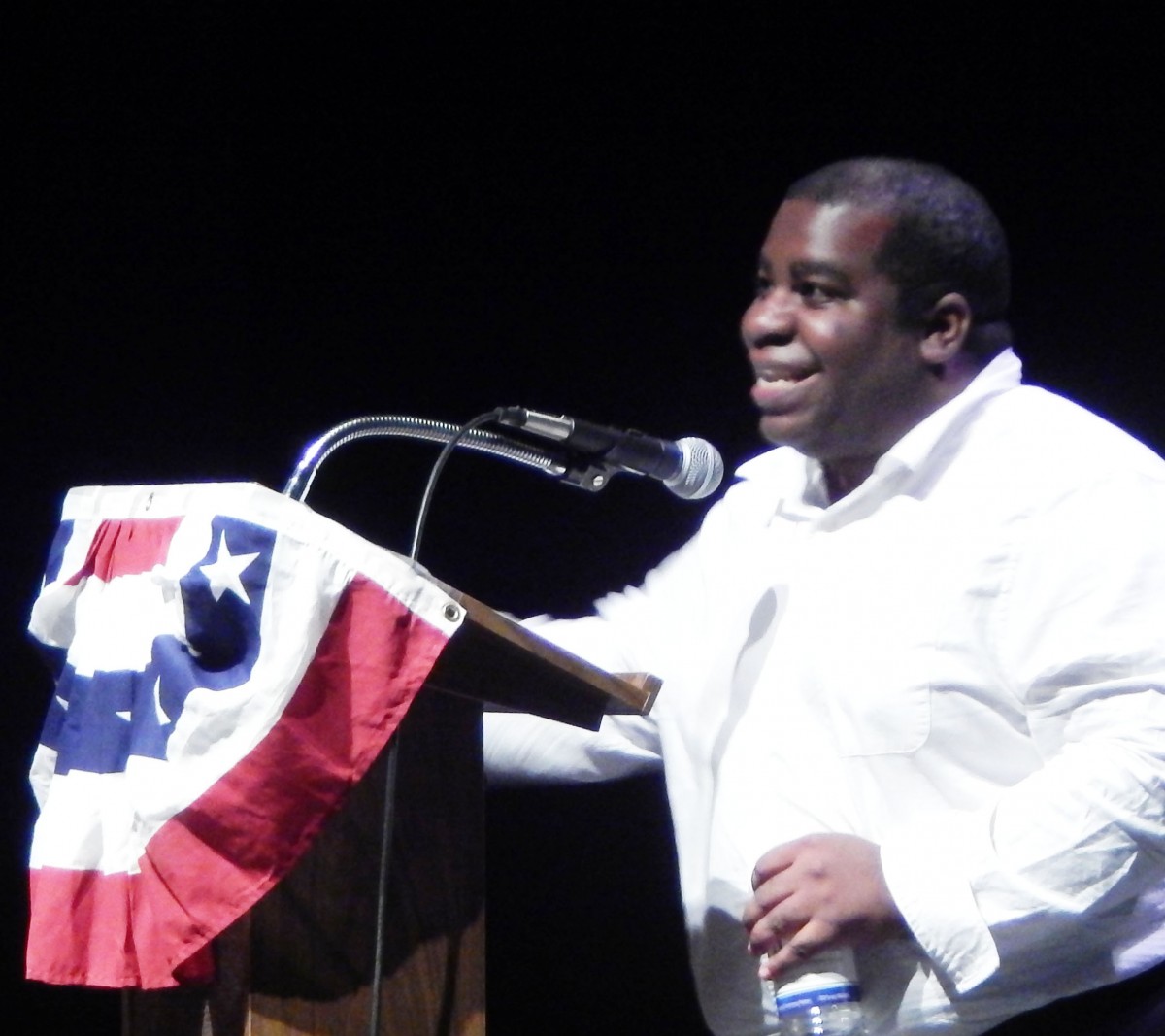The four finalists for the 2018 Great American Think-Off are (in alphabetical order): Tonya Abari of Nashville, TN; Anthony Berryhill of Austin, TX; Mark Bland of Virginia Beach, VA; and Rudy San Miguel of New Orleans, LA. Berryhill won the debate on June 9, while Bland came in second.

Read the Honorable Mentions Essays Here
Read the Finalists’ award-winning essays below:
Tonya Abari 
Success with a Side of Failure, Please
“There are no secrets to success. It is the result of preparation, hard work, and learning from failure.” –Colin Powell
As clear as the midday sky, the first time that I experienced failure is a vivid photograph perched upon the back corner of my earliest childhood memories. At six years old, failure wasn’t a feeling or topic that I had already explicitly encountered; yet, it subtly landed on my shoulder during the first round of the state dramatic reading championship. Conquering the rounds locally, I was surely a shoo-in to take the state title. After many weeks of diligently preparing a short dramatic reading of Shel Silverstein’s “LISTEN TO THE MUSTN’TS,” the words were so fitting, that I really believed that “anything could be,” including winning the state title. The odds were stacked against me before I even took the stage. The lone representative from a school district that wasn’t on anyone’s radar. The lone person of color. The lone contestant whose parents couldn’t afford a fancy competition dress and new, sparkly shoes. The lone contestant who read in a distinct Baltimore vernacular. Somehow, though, I was confident in my ability to beat the odds.
The performance was powerful—my best one to date. I read with passion, clarity, and particular emphasis on the last line of the poem, “ANYTHING can be!” I believed it. However, when the judge announced the runners up, I didn’t hear my name. There was a two-minute pause until the first-place winner was announced, all which was spent trying to shush the voices in my head that were arguing over the competition’s outcome. When the winner was announced, I intentionally blocked the sound, but to my right I saw an ecstatic girl sprinting towards the podium to claim the championship trophy. In that moment, I felt a single tear run down the right side of my face.
As the eliminated contestants exited the stage, one of the judges whispered something to those who had not been named winners. “Remember, failure is simply success turned inside out. I expect to see you all next year.” Suddenly, those tears transformed into hope. Did I win the state title? No. Did this mean I was a horrible reader? No. Was I going to try again? Absolutely. This was a tough lesson to learn so early, but a necessary one. The next year, I practiced harder, returned to the state championship and received second place. The year after, I danced to the winner’s circle to pick up my first-place trophy. Failure created an insatiable desire to do better.
In the 30 years post learning that first memorable lesson, failure has since shown up to my doorstep more times than I can count. Both microscopic missteps and colossal failures that have cost employment, savings, residences, and security. There were many times when failure (especially the extensive ones) made me uncomfortable. At times, failure’s villainous stare discouraged me from believing that I was even capable of success. Our society glorifies success, which doesn’t allow us to see others’ failures, even if they are the catalysts behind winning. All of these factors can make one believe that failure can only negatively shape your life.
However, reality is that failure is a vital stepping stone to success—and despite popular belief, it does not have to be painful. Just ask anyone who is considered a success. Oprah Winfrey. J.K. Rowling. Les Brown. Albert Einstein. The accomplished ballet dancer or the tenured grade-school teacher next door. All of their success stories likely include paths that were sprinkled with failure.
There are great lessons that come from failure—lessons strengthen and develop the character. When I poured my life savings into a business that failed, I may have lost the LLC but I gained experience and knowledge about being an entrepreneur. When I moved thousands of miles away to pursue a job that eventually laid me off, I appreciated the beauty in navigating places outside of my comfort zone. When doctors warned me that obesity and hypothyroidism was causing infertility, I became resilient and relentless in my pursuit of natural healing and fertility. Failure humbles the spirit in unimaginable ways, allowing humans to find strength, to persist, and to conquer.
While life’s road to success is still unfolding, I am reminded by that great lesson I learned three decades ago. Each failure is a lesson and not a punishment. Failure is success turned inside out; and my life is infinitely better because of it.
~~~
Rudy San Miguel 
The automatic doors at Winn-Dixie shuddered open as I tightened my grip on the plastic bag full of coins. A frail man with watery eyes and a “Hello! I’m Roger!” name badge pointed me toward a machine that would take my change and turn it into roughly 85-percent its value in cash. At 41, I possessed two master’s degrees, twelve dollars in my bank account, and this bag which I’d hoped would be enough for a loaf of bread, some peanut butter, and at least half a tank of gas.
As I poured the change into the bowels of the hunkering machine, I thought of a favorite quote from Mary Pickford in which she assured us that each day is a new chance for success. The quote ends, “…this thing we call failure is not the falling down, but the staying down.” Despite being virtually unable to secure a job in any field remotely related to any degree I’ve earned, I’ve managed to squeak by on meager tips from miserable food service jobs and hobble out some semblance of a life with the additional assistance of good friends, a patient partner, and great beer. For more than two decades, I’ve been floating in endless, choppy waters that will one day drown me, but I hold on, waiting for the right ship to pass. As Pickford suggests: I get up.
Some time ago, I was given a book—the name of which I cannot presently recall—written by a former Harvard-educated attorney who, after many years of unsatisfactorily earning piles of cash in New York, decided one day to walk away from her job and become an artist. Her successful crossover led her to motivational speaking. She’d go to high schools and ask the kids who they thought was the most successful: the doctor, the lawyer, or the poet? The children, naturally, would attach a dollar amount to that question and choose the doctor or the lawyer. But the writer argued that success was measured not by amounts of money but by happiness and the ability to do what one loves every day. In her example, if all three were doing the thing they loved, all three were successful, regardless of who was eating at a table in the fancy restaurant and who was eating from the dumpsters out back.
As a dreamer and someone who firmly holds that everything must happen for a reason, I believe all experiences we have in a day are successes—even the negative ones—for they shape us and determine our next step. As a child, when I would fail at something, my father would always ask, “Did you learn anything?” We are shaped by all of these successes regardless of whether we arrive at the change machine and are given more money than we had hoped for, or the bag filled with coins splits open and all the coins fall down the drain. In the end, the success is in getting more money or learning to use a stronger bag next time.
What, then, is failure? I’m reminded of another quote that goes something like “God never gives you more than you can handle unless you die of something.” Success is getting out of bed this morning and finding moments in life that will give us the strength to get out of bed tomorrow morning. Success isn’t always tangible and can’t be quantified. Instead, it is like matter, existing all around us. When there is no more success to be had, we stop getting up. I believe failure is that moment when our successes become too few and inconsequential that we, as Pickford suggests, stop getting up. Failure is, quite frankly, death. How death greets us can be at our own hands, at the hands of another, or most likely, by the hands of time, nature, or for some, a higher power “giving us more than we can handle.” Failure does not exist outside of death; therefore, we can’t be shaped by it. It is our successes—our every experience and our reaction to those experiences—that determine who we are and how we interact with others and the world around us. Our successes determine if we get back up. Failure is never getting up again.
~~~
Mark Bland – Runner-Up Armchair Philosopher! 
Like paying taxes and dying, success and failure become a part of the human condition from which we cannot escape. If you fall off the horse or bicycle, you get back on it. Do that enough times and you become proficient at the task of riding. You started with failure and ended with success, but which played a larger role in shaping your life? Success was the winner if you can now ride the horse or bike. Failure may have held you back for a while, but success gave you the confidence to continue.
My first memorable experience with success came in high school when I realized I could outrun any student in my class. Finally, I was actually better at something than most. I was good at baseball, basketball, boxing, tree riding, train jumping, and football, but I was great at running. Track became the natural outlet for my talent.
I didn’t win every meet, and it is true that these failures caused me to work harder, but the wins were what kept me in the game. What gave me pleasure was winning the 800m for the City; the losses no longer mattered. Success kept me running. Had I settled for failure, I would have never made it back to the starting line.
One year after graduation, I found myself in the army in Stuttgart, Germany. I was put in a slaughterhouse where I did meat inspections for the military. Not one person in the slaughterhouse spoke English, and I didn’t speak one word of German. The days became long and lonely, and the work more difficult without the ability to communicate.
Every evening I learned ten phrases that I could use the next day. Within three months, I communicated effectively in the language. I could say anything I wanted; I could read fairly well; and over a beer and bratwurst, I could understand the lunch jokes.
Because of my success with German, by month four as a PFC I was selected to be the chauffeur for the commanding officer of our unit. No PFC had ever driven the Colonel before, and some of the soldiers had as many as three tours in Germany. I was given a car, a jeep, and a ¾ ton truck to use at my wish. No more long days at the slaughterhouse, no formation, and no field maneuvers awaited me. Success even came with a promotion.
After returning to the States, I attended Old Dominion University where I earned my first degree, a BA in German. Forty years later, I retired as a high school and middle school German teacher for the Virginia Beach Schools. My success in German had shaped my entire career. Failure was nowhere in sight.
Before I began my teaching career; however, I went through a ten-year period of constant failure. I worked as a truck driver, a salesman, bowling- lanes- technician, waiter, chauffeur, clerk, truck loader, carpenter, lifeguard, gas- station- attendant, mechanic, steel supervisor, handyman, trapper, crab- boat- captain, and furniture deliverer. None of these jobs provided enough income to support a family. Failure had kept me company all the way.
By the time I was offered my first teaching position, I was six months behind in my trailer-park-rent. I was driving a car I bought for $200; my trailer was in desperate need of repair; we didn’t even have an operative furnace, and we were one payment away from losing our trailer.
The Christmas of that year, I bought my wife a pair of underwear, my daughter a pair of socks, and my son a toy truck. I chopped down our Christmas tree in the woods, and we spent the holiday without heat.
I do know the meaning of failure, and I understand its devastation, but I didn’t let it shape my life.
During my years as a teacher, I also fell in love with chess. Here, success was slower in the making. Mr. Failure shook my hand over and over. Even Bobby Fisher stated that you have to lose a thousand games before you begin to get better. Well, I lost my thousand games, but today I have sixty-four trophies, several thousand dollars in prize money, twenty-three trips to the World Open, and chess six days a week. Mr. Failure only rides in my backseat and bothers me once in a while. Success sits beside me in the front and keeps me company.
~~~
Anthony Berryhill – America’s Greatest Thinker for 2018! 
If I had never failed at things I once wanted to achieve I know I would be the unhappiest person in the world. I have been a personal failure many times: Harvard has rejected me three times for college admission; McKinsey put the “Rejected” stamp on my application when I applied for a job; and the number of failures at getting a date is nearing the thousands.
But in all of those cases failure truly tested my desire for what I thought I wanted out of life. I applied to Harvard because my Dad told me that it “has the best brand name.” I blindly filled out the college application form with little thought about the culture, curriculum, student life and most of all—the weather. I applied to McKinsey because I was told in graduate school it was “the best place to work.” But I didn’t factor in the long hours, the drain of travel or if I’d actually enjoy doing Excel 70-100 hours a week. And finally, I cannot count the number of times I’ve asked a woman out on a date based strictly on her looks or my guy friends’ peer pressure. In retrospect the failure at scoring a date saved me a lot of heartache, drama and mutual dissatisfaction.
The larger point is not about my personal and professional tastes but instead to emphasize how failure sharpens our decision making and emotional swords. It is easy to go for things and pray for success based on peer pressure and groupthink. As a teacher of high school debaters I see this year in year out—students are told what to value, love and strive for by their peers and their parents. But when I ask them why they want these things the common answer is some version of “because I want to be the best! Everyone else says I need to do it!” but little true desire.
Failure provides a sobering and immediate correcting force. But it does not only correct for shallow and superficial thinking about what we want or how we define success. Assuming that one’s goals and intentions are pure failure guides us through the maze toward succeeding. Edison famously viewed his thousands of failures at creating a functional light bulb as part of his education. Einstein was labeled a reject and failure in school because he was an out of the box thinker. And finally, if you look at the backgrounds of any of the “Sharks” on Shark Tank their roads to multi millions were no picnic either. But in all of these and other examples failure – when viewed with the proper perspective – shapes one’s life by building character and steering one in better and more fruitful directions.
Success is dangerous. It can create an illusion of invincibility. Crises can occur when success is knocking at your door because you don’t know—or you are blissfully unaware— that a big problem is brewing. I’ve seen first hand how success can lure the senior management of a company that everything is well and there are no problems until something surprising hits.
Governments are especially vulnerable—as a Katrina survivor I saw the pictures of my previous family home after it got hit with 20 feet of water. I still think about my city neighbors who spent decades riding out storms and “successfully” doing so. Many, unfortunately didn’t live to survive the “correction” to their hubris.
Success enables one to ignore the possibility of failure or catastrophe. It inspires ideas like “momentum” and “inevitability” in sports and professional competition. Groupthink kicks into overdrive – shutting down any “naysayers” who warn that the successful may have metaphorically no clothes on. Just ask the 72 win Golden State Warriors and all of the sports journalists who said it was “impossible” for the team to lose.
Failure shapes life on both ends—it gives us feedback on the decisions we make and if we let it, it can warn us before we go off course. In my own life failure and rejection saved me from the bitter cold of Cambridge, 100 hour weeks and hundreds of miserable dates. Thank God for Failure.